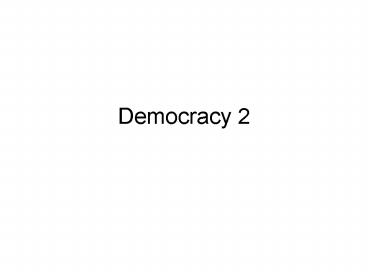Democracy 2 - PowerPoint PPT Presentation
1 / 20
Title:
Democracy 2
Description:
Civilian control over the security forces. Substantive democracy ... (1) Social and economic modernization (2) Class structure (3) Military (4) Political culture ... – PowerPoint PPT presentation
Number of Views:42
Avg rating:3.0/5.0
Title: Democracy 2
1
Democracy 2
2
Roadmap
- Democracy ?
- Preconditions for democracy?
- Third Wave causes?
- Democratic transition and consolidation
- Democracy and public policies
3
I. Democracy
- (1) Origins
- Demos (people) kratia (rule)
- Initially, a direct form of self-government
- (2) Currently, a system of government in which
the majority of the people rule but the rights of
the minority are protected - (Liberal Democracy)
4
(3) Democracy ?
- Minimalist vs. maximalist definitions
- Minimalist (electoralist) definition electoral
democracy - Electoral democracy semi-democracy
- Electoral democracies
- Free fair elections
- - Human rights violations
- of electoral democracies in the world has
tripled since 1974
5
Full (liberal) democracy
- Inclusive citizenship
- Rule of law
- Freedom of expression
- Free and fair elections
- Equality in voting
- Citizen control of the agenda
- Freedom of association
- Civilian control over the security forces
6
(No Transcript)
7
Substantive democracy
- Not only procedures, but also policy outcomes
- E.g., equal access to public schooling and health
care - ? India not a full democracy
- (India is a liberal democracy it is not a
substantive democracy) - Is India a democratic under-achiever?
8
II. Democracy prerequisites
- (1) Social and economic modernization
- (2) Class structure
- (3) Military
- (4) Political culture
- (5) Colonial legacy and/or democratic traditions
9
II.1. Social economic modernization
- Economic development
- Literacy/education
- Democracy
- Mass communication
- Urbanization
10
II.2. Class structure
- Middle class ? Democracy
- Why?
- (i) Moderation
- neither too leftist (working class)
- nor too Conservative (upper class)
- (ii) Political organizational skills
(education) - Europe vs. Latin America
11
Latin America?
- literacy
- urbanization
- economic development
- economic inequality ? weak middle class
- powerful, independent military
12
II. 3. Military Politics
- Example Turkey
- In Turkey, the military is an independent
institution with a political role - No civilian control
- By law, the military has the right to intervene
in politics - (Other examples Indonesia, Latin America)
13
II.4. Political Culture
- Commitment to protection of dissident political
beliefs (esp. the elite) - What makes political culture democratic?
- (Protestantism)
- Western Christianity
- Islam?
- Democratic gap Muslim or Arab?
- Religious national political culture can and do
change - Democratic culture ? democracy
14
II.5. Colonial legacy democratic traditions
- Colonial legacy former British colonies (India,
Caribbean) - Democratic culture? Bureaucracies?
- Democratic history ? democracy/democratization
15
III. Third Wave
- Huntington three democratic waves
- 1820s-1920s first, long wave
- 1922 first reverse wave
- WWII 1962 second wave
- 1960s early 1970s second reverse wave
- 1974 Third Wave ( of electoral democracies
increased threefold since)
16
Third Wave why?
- Causes Internal external
- Internal
- performance legitimacy problems
- economic growth
17
External International environment
- External actors (EU, Soviet Union, United
States) - Eastern Europe from Brezhnev Doctrine to
Sinatra Doctrine - Changing role/doctrine of Catholic Church
liberation theology - Snowballing
18
IV. Democratic Transitions
- Democratic transition moving from an
authoritarian regime to a democratic one - Beginning first signs of collapse or negotiating
exit - End first freely elected government takes office
- Democratic consolidation democracy has become
the only game in town - Huntington the two-turnover test
19
V. Democracy and public policies
- Measure commitment to public education and health
care - Educational expenditures slightly higher in
democracies (as of GNP) - Significantly higher (as of total govt
expenditures) - Similar results for health care expenditures
20
What makes democracies endure?
- Economic development ?
- Democratic survival
- Why?
- Education
- Class conflict
- Economic performance?

